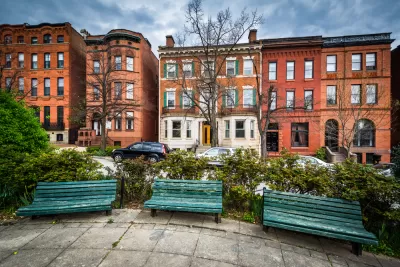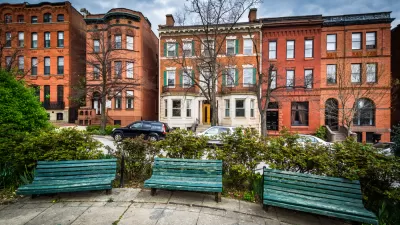The decision by the Baltimore County Council allows landlords to continue using "source of income" as criteria for prospective tenants. Such practices are often used to bar residents relying on housing vouchers.

"The Baltimore County Council rejected a bill Monday that would have made it illegal for landlords to discriminate against prospective tenants who use government housing vouchers to pay their rent," reports Pamela Wood.
"The council was required to consider the bill as part of a settlement of a housing discrimination complaint negotiated between the county government and the U.S. Department of Housing and Urban Development. Members voted 6-1 against it," adds Wood.
Wood details both sides of the political debate over the bill, which culminated this week after an "impassioned" public process last month. Wood shares talking points and arguments made by many of the politicians responsible for the bill's demise.
The news of the bill's failure also made the round on websites familiar to Planetizen readers, including an article on the Washington Post's Wonkblog, by Emily Badger. Badger writes that the bill's failure continues the tradition of legalized discrimination enabled by "source of income" criteria.
"Because this kind of discrimination is broadly accepted, the federal government’s largest housing program for the poor doesn’t work like it should," writes Badger. "Families with vouchers designed for the private market find much of the private market closed to them."
Jen Kinney also summarizes the news for a post on Next City. Kinney concludes by noting that "the county is required to take up the bill again after the next county elections in 2018."
FULL STORY: Baltimore County Council rejects housing anti-discrimination bill

Planetizen Federal Action Tracker
A weekly monitor of how Trump’s orders and actions are impacting planners and planning in America.

DARTSpace Platform Streamlines Dallas TOD Application Process
The Dallas transit agency hopes a shorter permitting timeline will boost transit-oriented development around rail stations.

Congressman Proposes Bill to Rename DC Metro “Trump Train”
The Make Autorail Great Again Act would withhold federal funding to the system until the Washington Metropolitan Area Transit Authority (WMATA), rebrands as the Washington Metropolitan Authority for Greater Access (WMAGA).

Supreme Court Ruling in Pipeline Case Guts Federal Environmental Law
The decision limits the scope of a federal law that mandates extensive environmental impact reviews of energy, infrastructure, and transportation projects.

Texas State Bills to Defund Dallas Transit Die
DART would have seen a 30% service cut, $230M annual losses had the bills survived.

Bikeshare for the Win: Team Pedals to London Cricket Match, Beats Rivals Stuck in Traffic
While their opponents sat in gridlock, England's national cricket team hopped Lime bikes, riding to a 3-0 victory.
Urban Design for Planners 1: Software Tools
This six-course series explores essential urban design concepts using open source software and equips planners with the tools they need to participate fully in the urban design process.
Planning for Universal Design
Learn the tools for implementing Universal Design in planning regulations.
Roanoke Valley-Alleghany Regional Commission
City of Mt Shasta
City of Camden Redevelopment Agency
City of Astoria
Transportation Research & Education Center (TREC) at Portland State University
US High Speed Rail Association
City of Camden Redevelopment Agency
Municipality of Princeton (NJ)





























